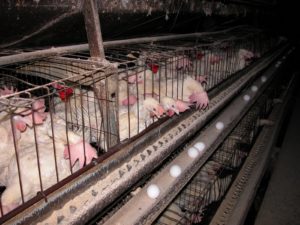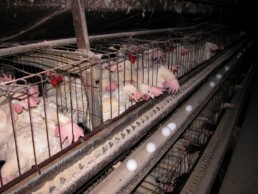Californians Ban Animal Factory Farm Techniques
In this week’s 2008 election, California unanimously voted to dismantle some of the animal factory farming industry’s most restrictive confinement practices. Restrictive being the operative word. The law that goes into effect in 2015 will phase out: 1) gestation crates that virtually immobilize sows throughout their pregnancies; 2) veal crates where male dairy cows are anemically confined; and 3) “battery cages” that afford a laying hen no more living space than a standard piece of copy paper and six to seven companions.
Of these three confinement systems, California’s egg industry will be the most severely affected. The Los Angeles Times estimates the size of the state’s flock of egg-laying hens at 20 million. Hog and veal operations are limited throughout the state, the nation’s largest agricultural producer. Throughout the campaign, conventional egg producers threatened to move their operations across state lines or even south of the border if Proposition 2 passed, sounding alarms that California’s egg supply could face food safety threats. With the passage of the law, egg producers who do choose to stay in business will have to shift their operations to free-range systems, a small but swiftly growing segment of the national market.
 Proposition 2 was championed by the Humane Society of the United States, Farm Sanctuary, and the California Veterinary Medical Association, among many others. The opposition included egg and hog producers farmers both in and outside the state, as well as the American College of Poultry Veterinarians, who claimed the law would be economically disastrous for California egg producers and raise prices for consumers.
Proposition 2 was championed by the Humane Society of the United States, Farm Sanctuary, and the California Veterinary Medical Association, among many others. The opposition included egg and hog producers farmers both in and outside the state, as well as the American College of Poultry Veterinarians, who claimed the law would be economically disastrous for California egg producers and raise prices for consumers.
California has long considered a bellwether for political, economic, and cultural trends across the nation and the world. And for this reason the campaign was hard fought, with both sides raising $8.5 million for their effort, according to the Los Angeles Times. Both sides also see this as a sign of a national snowball against animal factory farms—perhaps not just on confinement systems, but on environmental and labor violations, greenhouse gas emissions, as well as grain subsidies that all together, have created a nightmarish and unsustainable meat, dairy, and egg production supply. (Also the subject of an upcoming Watershed Media book, The Animal Factory.)
What we are witnessing here is the emergence of ethics and food production issues not just in a state referendum but in what could soon be a national policy dialog. There is little time to celebrate, however. While Californians passed this step toward humane farming, the Bush Administration eased restrictions on feedlots and Confinement Animal Feeding Operations (CAFOs). Under just issued EPA requirements, large livestock facilities (whose waste flows often exceed those of small cities) can avoid obtaining pollution permits as long as they claim they will not harmfully discharge into nearby waterways.
Sure, we believe you're not dumping your shit in the creeks, streams, and waterways!
The new voluntary compliance law is unimaginable in its neglect of the public trust. It is part of the final act of an administration which will no doubt be remembered for its cronyism, corruption, contempt of government, and transfer of the public treasury and well being to the private sector.
And while Californians voted in favor of the first African American president, for more humane treatment for animals, and in support of a high-speed passenger rail system, we also voted for a restriction of marriage between a man and a woman.
Obviously, there are still more miles to travel and mountains to climb and not a moment to lose. As my classics professor said to me upon my completion of undergraduate work, “Go forth and be frustrated.” But don’t forget the hope for a better world delivered in the 2008 election.
For a sense of the potential ripple effect of California's Humane Farming Act, check out this article in the Des Moines Register
Eating Like An Activist
How did food suddenly surface—along with nuclear fallout and climate change—as one of the critical issues of our time? I guess when we all woke up and realized that we eat at least a few meals a day. And all of those individual food choices actually carry real world economic, social, and ecological consequences.
After all, we only get to vote once a year or even every few years for the handful of people who ultimately call the shots in politics, and by extension, the corporatocracy. Only so many of us are cut out to be congressmen, agribusiness CEOs, or fast food barons. But if we really thought long and hard about the state of our country and the challenges ahead of us—about our squandered resources and mismanaged opportunities for leadership—most of us would be out on the street engaging in nonviolent protest twenty-four hours a day, seven days a week.
Which brings us back to food. It’s something tangible we can do something about. It’s something delicious that we can get passionate about. Eating is an act that grounds us to the present, to the future, to the land, to each other.
And it’s true, over the past fifty years the global food system has assumed Weapons of Mass Destruction-like propensities all its own. Fields are pumped with explosives-grade fertilizers. Wild areas have been devastated by the voracious planting of corn and soybean and wheat and rice and cotton and sugar cane monocultures. Mega-dairies and mega-feedlots unable to contain their toxic manure have driven people out of rural areas because they can’t breathe, can’t drink the water, can’t tolerate the countryside, can’t eat the fish, and can’t coexist with the flies. There are over 150 Dead Zones in waterways around the world. These are bays and gulfs and aquatic environs where agricultural nutrient contamination causes algae blooms that suck the life sustaining capacity out of the water. Fisheries collapse. Nothing survives. It’s eerily like nuclear fallout.
The maraschino cherry on top of all this is the obesity crisis. That economic disaster is just waiting to bankrupt state treasuries across the nation in the form of lost work days, drug prescriptions, doctors appointments, heart by-pass surgery and diabetes treatments, joint replacements, and hundreds of billions of dollars in other insured and uninsured annual medical bills.
But maybe there is a way out. “Eating,” wrote the Kentucky philosopher Wendell Berry, “is an agricultural act.” By that he meant that our food comes from the land, and that land is ultimately affected by the everyday choices and purchases of eaters. Berry might also have said that eating is an existential act. By this, I mean existential not in the I eat therefore I am sense, but in a more philosophical, why are we here? what makes us human? big picture kind of sense. Surely we eat to live. But how we accomplish this most basic and gracious and potentially spiritual act also says a lot about us as people—defines us actually—as a culture, as a species. Perhaps we don’t have to eat our way down to the last wild Chinook salmon, or reduce the Earth’s magnificent biological diversity to just a handful of species that satisfy our encroaching global culinary autism.
Something has to change. We simply can’t keep eating this way. We need to act, to start eating like activists: at the dinner table, at farmers’ markets, at our pre-schools and soccer games. How can our food choices influence the world we would like to live in, a world we would feel okay about passing on to our children and grandchildren? Here are a few rough compass points.
Wage your own personal battle against single-use disposable food and beverage containers. By this I mean plastic and paper packaging that will be used once, but is then destined to spend eternity afloat at sea, squashed in a landfill, or wasting away loathingly on the landscape. You can do this by shopping with your own reusable bags, staying in restaurants and cafes rather than taking out, buying food in bulk rather than single servings, making alternatives to bottled water and other disposable beverage containers.
Develop familiarity with the people who grow your food. Organic produce eaten out of season and shipped around the globe doesn’t count as activist eating. Buying food locally or regionally from farmers you know and whose farm practices you are familiar with is a good basis for a food ethic. Eco labels such as organically certified, shade grown, and biodynamic can help you identify good practices on items produced faraway—coffee, wine, grains might come to mind. But ultimately, familiarity with producers is the highest form of certification.
Help to dismantle the Industrial Animal Factory Complex. Mega-dairies and mega-feedlots that house tens of thousands of cows, chickens, and hogs in a single complex have become barbaric, unhealthy, and unecological modes of food production. Learn what you can about what goes on inside these massive operations, then do what you can to alter your diet accordingly. Maybe you’ll start with the industrial breakfast by reconsidering eggs produced by hens in crammed battery cages or bacon from hogs reared on cement-floored confinement sheds. These industrial production methods essentially thwart the animal’s every natural instinct. A healthy breakfast can lead to a whole day of sound choices around animal products.
Vote with your fork. Get political. Learn about the importance of the Farm Bill that is reauthorized by Congress every five to seven years. Meet your representatives and ask them if they have a “Post Cheap Oil Plan” to maximize a renewable farming system based on organic methods, and regional food production and distribution where you live.
Connect your eating and cooking habits with climate change. A recent University of Chicago study showed that eating a more vegetarian diet may be more influential in reducing an individual’s carbon footprint, even more than the car you drive. One main reason? The tens of billions of livestock living in confined animal factories produce nearly 20 percent of all greenhouse gas emissions worldwide. This issue is not, however, entirely black and white. Livestock raised locally on a grass-fed diet may compare favorably, and organic produce shipped half way around the world, could arrive with a large CO2 price tag.
Wash your own heads of lettuce and other leafy greens. In the United States, more than half of all pre-washed, pre-cut leafy greens are grown in the nation’s Salad Bowl, the Salinas Valley. Unsafe production conditions there have resulted in isolated incidences of Salmonella, E.coli 0157 , and other pathogens entering the food system primarily through convenience-oriented pre-washed and bagged leafy greens. Industry has responded by waging a war on habitat and wild animals in that area, even though the most probable origin of the lethal E. coli 0157 was cows being fed a corn-intensive diet in the area.
Don’t be afraid to be radical. Newsweek recently highlighted a new group who call themselves the Freegans because they eat only free (surplus) vegan food. That’s pretty hardcore. But, hey, we can all start somewhere. Try growing some of your own food. Tear out some of your lawn and build a garden that becomes your hobby and your workout gym. Become a food artisan. Make your own bread and wine and vinegar and canned tomato sauce. Raise some laying hens in the backyard. There are a lot less worthy things to do with your time.
Make a place in your life for native bees. Three out of every four bites of the food we eat require some sort of pollinator to arrive at our tables. Most of this work is presently done by domesticated honeybees, but those bee colonies are on the verge of a precipitous collapse in agricultural areas all over the world. Native bees that have co-evolved with native plants (and their own sources of pollen and nectar) are our best insurance policy against a potential catastrophe and are best preserved with areas of healthy wild habitat.
When it comes to food, perhaps a word like revolution doesn’t have to seem ominous or pretentious or threatening. There is certainly plenty to be angry about—especially if you live anywhere near a 20,000 cow dairy or mega-feedlot, or follow U.S. Farm Bill politics. But there is also plenty to get excited about. The local food revolution starts at home. It can start right away and offer whole new ways of seeing the world and our rightful place at the table.

